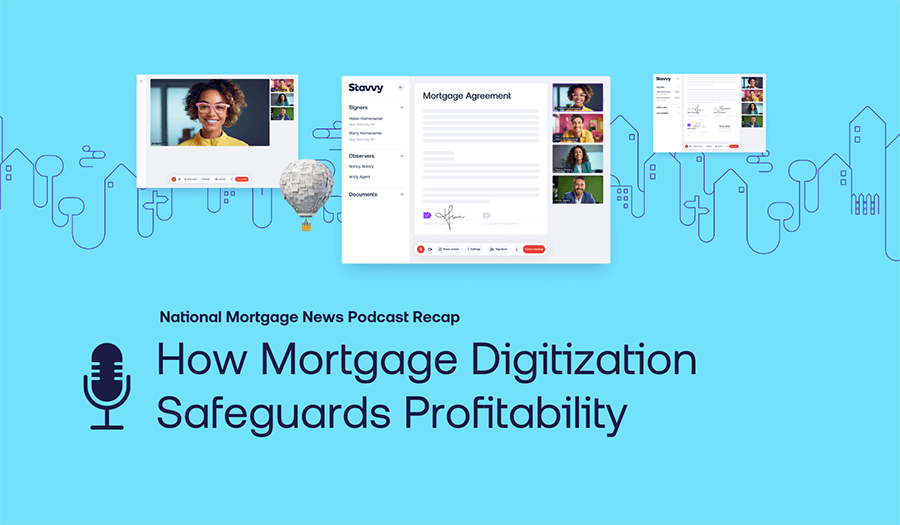Remote online notarization (RON) technology has been around for over ten years, making time for over a decade’s worth of big remote online notarization myths.
Despite growing popularity at the legislative and industry level, some mortgage professionals still believe common remote online notarization myths are true. To help you separate fact from fiction, we collected and debunked some of the most common remote online notarization myths circulating in the mortgage and real estate industry today.
4 common remote online notarization technology myths busted
1. Remote online notarization is temporary technology
The social distancing impacts of COVID-19 showed the cracks in the status quo—traditional, in-person closings and notarization are no longer scalable for title and settlement agents or strategic business growth.
While remote online notarization may have initially been positioned as a solution to mandatory COVID-19 social distancing, the forward momentum on the state and federal legislative level has us optimistic that the SECURE Notarization Act and industry-wide adoption is imminent.
Additionally, many title and settlement agents, real estate attorneys, and lenders are experiencing the benefits of remote online notarization firsthand, making it hard to believe that efficient digital closing options are only a temporary industry measure.
2. Remote online notarization technology will replace title agents and closing attorneys
This myth makes us chuckle a bit, and here’s why. Mortgage technology, like remote online notarization, unlocks human potential.
With the support of technology, title and settlement agents are less bogged down in manual to-dos and tasks and, therefore, able to fine-tune their craft, personalizing and humanizing the closing experience for homeowners.
Think of remote online notarization as your supporting actor. As the title agent, you’re still in the lead role before, on, and after closing day. With remote online notarization, you no longer have to chase paper documents, locate postal trucks, email homeowners and request that they sign documents post-closing, or schedule in-person closings scattered across the state. Instead, you can focus on facilitating exceptional closing experiences and building solid relationships with homeowners, lenders, and business partners.
3. Remote online notarization is not secure technology and welcomes identity fraud
This statement could not be more false. The security measures of an eClosing ensure that every step of the process is protected, compliant, and correctly executed. Enhanced security for a RON transaction is possible with mortgage technology features, including but not limited to:
- Audio-visual communication with secure meeting links and knowledge-based authentication (KBA)
- Multi-factor authentication and verification for identity proofing
- Digital certificates and notary seals for tamper-sealing
- Digital audit trails that make a chronological record throughout the transaction
- Secure digital storage capabilities for safe record keeping
Let’s quickly walk through an eClosing with remote online notarization using the Stavvy platform and identify the specific security measures and checkpoints that are possible with digital closings.
First, a title and settlement agent, real estate attorney, or lender prepares and schedules a remote closing session in the platform and sends a secure meeting link to all signers.
All signers receive an automated notification with pertinent signing details, including a secure meeting link and instructions. When signers join the online meeting, all identities are verified via KBA and credential analysis in the platform before the closing session begins.
What is knowledge-based authentication and credential analysis?
Knowledge-based authentication certifies an individual’s identity via secret questions, and credential analysis validates a government-issued photo ID.
During the closing session, the remote notary and signer(s) use secure audio-video communication technology to conduct and record the closing. The ability to record and store a real estate closing with remote online notarization is an extra level of security that is not available with a traditional, in-person closing.
Once the signers’ identities are verified, the signer and notary eSign the appropriate documents, the remote notary performs electronic notarization, and the platform creates a digital audit trail recording every step of the transaction. Stavvy then uses the digital notary seal applied by the notary and embeds the notary's digital certificate into the electronic document to tamper seal.
Lastly, the remotely notarized documents and closing sessions are saved and stored securely in Stavvy, where transactional data and documents can be downloaded and accessed at any time.
As you can see, digital mortgage technology helps protect mortgage professionals and signers, ensuring that every transaction is secure and compliant. From verifying everyone attending a closing and signing on the dotted line to creating digital audit trails, recording notarization sessions, and tamper-sealing digital documents, RON transactions are considerably more secure than a traditional closing session.
4. You can use any audio-visual communication technology platform for remote online notarization
There is no shortage of audio-visual communication tools and RON providers, each with varying features, functions, and capabilities. Some were created with the real estate and mortgage process in mind, whereas others serve multiple business types and don’t meet the minimum requirements outlined in state-level remote online notarization legislation.
Selecting an audio-visual communication tool randomly to conduct remote online notarization is not the move. Instead, you must do your due diligence, research different technology options, and interview vendors before determining the best fit for you and your business.
Scheduling and attending live, personalized demos is a great way to get a clear sense of a product, its ease of use, and any support, training, and onboarding services available to you.
To help narrow down your list of potentials, here are a few questions to ask during your next product demo.
- Does your product mirror our closing process?
- Do you provide remote online notarization-specific training and onboarding assistance?
- Is customer support available to me after product implementation?
We created a list of our top questions to ask during a remote closing platform demo so that you can find the perfect solution for your organization.
If you’re thinking beyond remote online notarization, discover which features make for an eClosing platform that can grow and evolve with your needs.
Understanding remote online notarization
Now that you have a clear understanding of RON fact and fiction, it may be time to explore answers to frequently asked RON questions. For more information about RON and tactical advice on performing RON closings, check out our Complete Guide to Remote Online Notarization
Editor's note: This post was originally published in September 2022 and is refreshed as updates become available.



![[Webinar Recap] Advancing Your Digital Default Servicing Strategy](https://blog.stavvy.com/hubfs/advancing-your-digital-default-servicing-strategy-blog-recap.png)